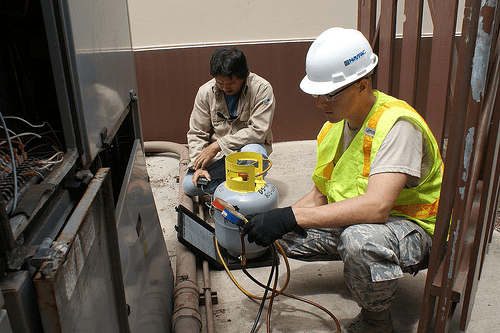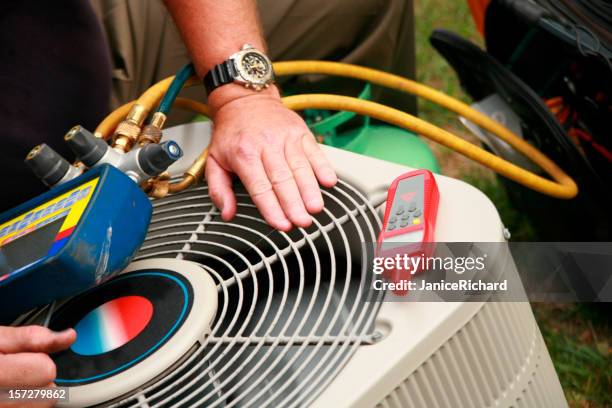Choosing In Between a Heatpump and Heater: Secret Considerations for Your Cooling And Heating Requirements
When examining heating choices for cooling and heating needs, the choice between a heatpump and a heating system can be complex. Each system uses distinctive benefits customized to particular climates and power effectiveness objectives. Comprehending these distinctions is vital for making an educated selection. Trick variables such as installment prices and environmental effect better complicate the selection process. Which option genuinely straightens with one's convenience and sustainability preferences? The following areas will certainly discover these factors to consider thoroughly.
Recognizing Warm Pumps: How They Work and Their Advantages
While lots of house owners think about numerous home heating choices, comprehending exactly how heatpump feature and their benefits can considerably affect their decision. Heatpump run by transferring heat as opposed to producing it. In the wintertime, they draw out heat from the outside air or ground and transfer it inside your home, while in the summer season, they reverse this procedure, cooling down the home by getting rid of warmth outside. This double performance makes them flexible for year-round environment control.One of the key advantages of heatpump is their energy performance. They use considerably much less electrical energy compared to conventional heating unit, possibly resulting in lower utility costs (heat pump service). Furthermore, warm pumps have a smaller carbon impact, making them an eco-friendly selection. They likewise need less upkeep than standard systems, contributing to long-lasting expense financial savings. In general, understanding the technicians and advantages of heatpump can aid home owners make notified decisions regarding their heating and cooling down needs
Discovering Heaters: Kinds, Operation, and Benefits
Heaters come in different types, including gas, electrical, and oil versions, each with unique functional mechanisms. Comprehending these distinctions is vital, as they affect efficiency and heating performance. Additionally, heaters provide various benefits, such as constant warm result and dependability in colder climates.
Kinds of Heating systems
Heating systems can differ significantly in design and operation, with heating systems being a popular option amongst homeowners. There are several kinds of furnaces, each making use of various gas sources and technologies. Gas heaters are typical, leveraging natural gas to create warm successfully. Electric heating systems, on the other hand, utilize electrical resistance to generate warmth, often preferred for their uncomplicated setup. Oil furnaces, while much less usual, work in locations with limited gas access (heat pump installation ooltewah tn). Furthermore, condensing heaters make the most of power effectiveness by recording and recycling exhaust gases. Each type runs with a system of warmth exchangers and ductwork to disperse warm air throughout a home. Comprehending the differences between these heater kinds is necessary for informed cooling and heating choices
Advantages of Heaters
For property owners looking for dependable heat during cool months, the advantages of heaters are considerable. Heaters give constant heating, making certain even temperatures throughout the home. They are specifically effective in severe cool, usually outmatching heatpump in frigid problems. Various kinds, consisting of gas, electric, and oil furnaces, provide versatility to meet diverse demands and preferences.Furnaces likewise tend to have reduced initial setup costs compared to heatpump, making them a much more available choice for many. Their durable style contributes to a longer life-span, with lots of systems lasting over 15 years with proper upkeep. In addition, modern-day heating systems are frequently geared up with sophisticated innovation for enhanced efficiency, which can cause minimized energy expenses. In general, heating systems remain a reliable option for effective home heating.

Energy Performance: Comparing Warm Pumps and Furnaces
When comparing power efficiency in between heatpump and heating systems, the Seasonal Power Efficiency Proportion (SEER) plays an important duty in figuring out performance. Furthermore, an operational expense analysis reveals the lasting economic ramifications of each system. Understanding these elements can assist property owners in making educated decisions about their home heating services.
Seasonal Energy Effectiveness Proportion
Power efficiency plays an essential function in the decision-making process between heatpump and heaters, particularly when considering the Seasonal Energy Effectiveness Ratio (SEER) This metric procedures the cooling performance of heat pumps over a whole cooling period, supplying a standardized means to examine efficiency. Greater SEER rankings show greater energy performance, translating to reduced energy consumption and minimized energy expenses. On the other hand, heaters are normally assessed making use of the Yearly Fuel Usage Efficiency (AFUE) score, which shows heating performance. When contrasting these two systems, home owners must focus on SEER ratings for warmth pumps, as they directly influence overall power cost savings and ecological sustainability. A detailed understanding of SEER can especially affect the lasting satisfaction and cost-effectiveness of the selected HVAC solution.
Functional Cost Analysis
Recognizing the functional prices connected with warm pumps and heating systems is essential for house owners evaluating their alternatives. Warmth pumps normally supply higher energy effectiveness, transforming electric power into heat with marginal waste. This causes reduced regular monthly energy costs, specifically in modest climates. Conversely, traditional heating systems, especially gas models, may have lower ahead of time prices yet can incur greater functional expenses over time as a result of fuel prices and performance ratings.Moreover, heatpump can work as both heating and cooling down systems, potentially decreasing the demand for separate HVAC systems. While preliminary financial investments for heatpump visit homepage might be higher, their long-term cost savings in energy efficiency can make them a much more economical selection for lots of families. Careful analysis of regional power rates is vital to figure out the most effective choice.
Installation Prices: What to Anticipate for Each Heater
Installation costs for furnace can vary substantially between heatpump and furnaces, influencing property owners' decisions. Heatpump usually have greater ahead of time installment costs, usually ranging from $3,500 to $8,000, depending on the system size and intricacy of setup. This consists of the exterior system, interior handling system, and essential ductwork adjustments. On the other hand, heaters often tend to have lower initial prices, averaging in between $2,500 and $6,000, which can be appealing for budget-conscious homeowners. Installment expenditures can boost if comprehensive ductwork is required.Moreover, the option of gas type for heating systems-- all-natural gas, lp, or electric-- can additionally influence installation expenses. While warmth pumps provide energy efficiency, their first financial investment may deter some customers. Eventually, evaluating installment costs along with long-term financial savings and performance will certainly help property owners in making educated choices concerning their heater.
Climate Factors To Consider: Which System Does Better in Your Area
Just how do environment problems affect the performance of furnace? The performance of heatpump and heating systems can vary significantly depending on the local environment. In moderate environments, heatpump click here for more excel by successfully moving warm from the outside air, making them an energy-saving choice. Their effectiveness decreases in incredibly chilly temperatures, where they may struggle to extract sufficient heat. Conversely, furnaces, particularly gas versions, give reputable and regular warmth no matter exterior problems, making them more effective in colder regions.In locations that experience milder winter seasons, heatpump can run properly year-round, supplying both cooling and heating. On the other hand, areas with extreme winters commonly take advantage of the robustness of heaters. Ultimately, recognizing the regional environment is essential when making a decision between click over here now a heat pump and a heater, as it directly influences their operational performance and general performance.
Upkeep Requirements: Long-Term Look After Warmth Pumps vs. Furnaces
While both heat pumps and heating systems need routine maintenance to assure peak performance, their certain demands and care regimens vary substantially. Heating systems usually require less regular focus, with yearly inspections sufficing to look for gas leakages, tidy filters, and examine total functionality. Their simpler style frequently permits for uncomplicated repairs.In contrast, heatpump require biannual maintenance due to their twin duty in heating & cooling. This consists of cleansing coils, examining refrigerant levels, and ensuring that both the outside and interior units function at their finest. Additionally, heat pump maintenance typically involves more elaborate parts, making specialist servicing essential.Neglecting maintenance can bring about reduced efficiency and increased energy expenses for both systems. Eventually, home owners ought to consider these long-lasting treatment needs when choosing in between a heat pump and a furnace, as positive maintenance can prolong the life expectancy and performance of either system considerably.
Environmental Influence: Choosing a Lasting Home Heating Alternative
The environmental impact of heating unit is an important evaluation for homeowners looking for sustainable alternatives. Warmth pumps are generally much more energy-efficient than conventional heaters, as they transfer warmth as opposed to generate it, greatly decreasing carbon emissions. By using renewable resource resources, such as geothermal or air-source warmth pumps, property owners can even more decrease their ecological footprint.On the other hand, all-natural gas heating systems emit greenhouse gases and add to air contamination, though they commonly supply higher warm result. Innovations in modern technology have led to the growth of high-efficiency heaters that decrease emissions.Ultimately, picking a heating system entails evaluating performance versus ecological influence. Home owners are urged to mirror on neighborhood power resources and motivations for renewable systems, guaranteeing an option that straightens with both individual convenience and environmental duty. The decision affects not just prompt comfort however also long-lasting sustainability and ecological health and wellness.
Frequently Asked Inquiries
For How Long Do Heat Pumps and Furnaces Typically Last?
The life expectancy of warmth pumps normally ranges from 15 to 20 years, while heaters can last in between 15 to 30 years. Normal upkeep significantly affects their durability and performance in offering heating solutions.
Can I Use a Heatpump in Incredibly Cold Climates?
Heatpump can run in extremely cold climates, however their effectiveness lessens as temperatures decrease. In such conditions, extra home heating resources may be essential to maintain comfortable indoor temperature levels and ensure peak performance.

What Is the Noise Degree of Warm Pumps Versus Furnaces?
The noise levels of heatpump and heaters differ considerably. Typically, heatpump run more quietly than typical heating systems, making them better for those conscious sound, while heaters might create louder functional noises throughout heating cycles.
Are Warmth Pumps Suitable for Both Home Heating and Air conditioning?
Heatpump are certainly suitable for both heating & cooling (heat pump installation ooltewah tn). They operate by transferring warm, offering efficient temperature level control year-round, making them a versatile selection for property owners seeking an all-in-one a/c option
What Dimension Heating Unit Do I Required for My Home?
Determining the appropriate dimension heating system for a home calls for evaluating aspects such as square footage, insulation top quality, regional climate, and the home's format. Consulting a specialist can ensure a precise assessment and perfect convenience. Heat pumps generally offer greater energy effectiveness, transforming electrical power right into warmth with marginal waste. In modest environments, heat pumps succeed by successfully moving heat from the outside air, making them an energy-saving alternative. On the other hand, furnaces, specifically gas models, supply reliable and consistent warm regardless of outdoor conditions, making them more suitable in colder regions.In locations that experience milder wintertimes, heat pumps can operate effectively year-round, giving both heating and air conditioning. Warmth pumps are generally extra energy-efficient than traditional heaters, as they transfer heat instead than create it, significantly minimizing carbon emissions. By using renewable power resources, such as geothermal or air-source heat pumps, homeowners can better minimize their eco-friendly footprint.On the various other hand, natural gas heaters produce greenhouse gases and contribute to air pollution, though they usually offer higher heat output.